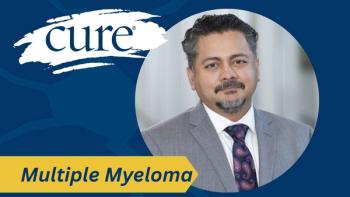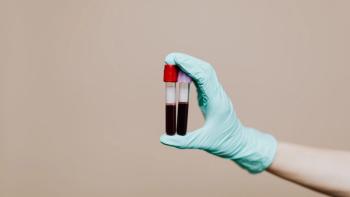
Reflections On The Journey of Cancer and Marriage
My journey with cancer officially began on November 11, 2014. Unofficially it begins in the early fall of 2014 with my persistent complaining about a sore back. At the time I was a very healthy 63-year-old husband, father, grandfather, university professor and psychologist by profession who was currently serving as the President of the Maine College of Health Professions. Successful laminectomy surgery provided little to no relief for the ever increasing back pain. Referral to another orthopedic provider resulted in an urgent kyphoplasty surgery in an attempt to stop the cascade of vertebral compression fractures as apparent in the x-rays that were taken. A biopsy was also secured. Toward the end of the third postoperative day, I received an unexpected telephone call from my primary care physician.
The doctor asked to speak with both my spouse and I at the same time. As I put the phone on speaker, she gave me a terrifying look, the kind of which only a medical professional would give. She is a nurse— and knew right away that something was terribly wrong. I got scared deep down inside. After minimal small talk, he then said the reason for his call was that he had some difficult news to tell me regarding the biopsy results from a few days earlier.
He said that the lab results from the initial biopsy suggested that I had a cancer which turned out to be a relatively rare blood cancer called multiple myeloma. I would learn later that Multiple Myeloma was an incurable cancer with an average life span of about 5 years.
To say that the news of the diagnosis by our primary care physician was shocking is an understatement.
After we hung up the phone, we sat in our living room holding each other and cried uncontrollably. What the hell is multiple myeloma I screamed, I cried….it was not fair. I was in good shape: I exercise regularly, eat properly, and took good care of myself — damn it! This is not supposed to happen. As I continued to rage, my beloved spouse, Bonnie, took my hand and cradled me as I cried my heart out. She petted my hair as if I were a baby and told me that we'd get through it and get through it together. She reminded me that we were married then for 41 years and that we had faced our own sets of issues and crises as most married couples do. We had managed the usual and the unusual during our years together and that we will find the strength and courage to deal with this.
"Yes, this is bad and devastating," she said, "but we are a strong couple and we will get through this. I will be strong for you; you can lean on me." Later that evening, it was her turn to let her emotions out. She began wailing. I held her, rocked her, and told her that I loved her very much and that whatever was in store for us, we'd get through it. Finally, it was lights out and we both managed to fall asleep albeit a restless one. The next morning over coffee we both went to our iPads to learn about multiple myeloma and were shocked to read about this rather rare form of blood cancer. We discovered that "MM" resides in the red blood cells and which for a variety of reasons goes on an "attack" consuming other cells usually found in bone marrow. We looked at each other and with tears streaming down my face, I blurted out, "what in God's name are we going to say to the children and grandchildren, how are we going to tell them?" Knowing that we are a very, very close family, Bonnie came over to me and put her arms around me and offered comforting words about coping, being strong, praying to God for help, guidance and support.
I took a deep breath, gave her a good morning kiss and finished my coffee. Over time, we worked out a plan to talk with our children and eventually my brothers and sisters. Little did we know that much, much more was yet to come. Our primary care doctor referred us to Helen F. Ryan, MD, the noted Hematologic Oncologist at the New England Cancer Specialist in Portland, Maine for an appointment. At the same time that this appointment was being established, we were able to secure a second opinion oncologist of significant scientific repute with Jacob P. Laubach, MD, MPP the Clinical Director of the Jerome Lipper Multiple Myeloma Center at the Dana Farber Cancer Institute in Boston.
Visits to each oncologist confirmed the diagnosis and we began the journey of chemotherapy and pain management. And, because my spine was crumbling and a further bone marrow biopsy took place, an aggressive regime of chemotherapy coupled with pain control was initiated. Through all those tumultuous initial days of tests, assessments, treatments, my back pain continued to worsen — much of the time with a pain level of 11+ within a 1-10 scale. Pain medication helped only for a very short while. Stronger pain meds were continually ordered without much improvement. Bonnie told the doctors that the pain was killing me, and it was.
A pain pump was installed, and it finally controlled the pain. I remained in a significant compromised and diminished state for many months. I would later learn that my spine lost 50% of its vertebral height resulting in 5 inches of lost height and weight loss of approximately 50 lbs. within this short period of time. Bonnie is a unique, strong and loving spouse who was committed to helping me manage the cancer. Her lifelong experiences as a registered nurse, with a PhD in nursing, and now retired Professor of Nursing at the University of Southern Maine, continues to positively influence my care and quality of life. She was determined that this potentially fatal news was not going to destroy us. How Bonnie managed to support me realizing that I stood a good chance of dying and leaving her as a widow, I'll never know. But that is the type of person that she is. She is a pillar of strength to me and ultimately to the children and family members, always providing the needed support when someone was in crisis over my disease. I am confident that she brought these same qualities to her patients, families, and nursing students.
Unbelievably, within two months of my MM diagnosis and during a routine physical and mammogram, Bonnie was diagnosed with breast cancer that required surgery, radiation, and long term medication. And, I should point out that during that same month of January 2015, I was hospitalized three times for extended periods of time for pain management and pneumonia. This left me with little or no appreciation for the heartbreaking trauma she was experiencing. While we kissed and I held her, the full comprehension of what she was experiencing was beyond my ability to comfort her and provide "care" that would have readily happened under normal circumstances.
So here we are— a family with both husband and spouse with cancer. The husband has been largely ineffective in providing any real support to his spouse. With vigilant screenings for breast cancer, Bonnie's prognosis is optimistic. However, knowing deep down inside that she has or has had breast cancer has created an aspect of her self-concept that now includes the concept that, like millions of other women, she too has had cancer. This knowledge, while clearly present, is now a permanent aspect of her self-concept and personality. And as her husband, and a psychologist to boot, I am too clearly knowledgeable that there is little I can do to help her alleviate any negative feelings that are associated with it. Although she has often expressed that she does not feel like a breast cancer survivor, I know different.
Now after 46 years of marriage, we are a caring, loving and committed couple. We live by a daily code of faith in God, and belief that a positive attitude will help us to survive and live a positive life for however long we have. We remain committed to one another, we believe in one another, and we deeply love one another. And in the end, we know with certainty that we'll be together for as long as we can and forever afterward. Cancer is a complicated disease. It certainly has a distinct physical aspect that runs a gamut from invisible pain to gross disfiguration depending on the type of cancer one has. Our ability to cope balances a deep-rooted change in our lives, always fearing that many people die an early death from it. Too, physical changes like strength, balance, and stamina can readily affect our daily living. And, at the purely psychological level, we learn that we are somehow different than others because we have this disease in our body and acceptance of a changed self-concept can be psychically painful for many.
There are many faces to cancer. These faces run a marathon of feelings - from sadness, fear, joy, belief, and faith to a myriad of other dynamics. Just the idea of having a disease in our body can, for some, cause a sense of disruption to our self-concept. And certainly, for all cancer patients and their families, a change takes place in our psyche that hopefully provides the opportunity for the expression of courage, gratitude, and positivity. For me as both a husband and a man, Bonnie's cancer has deeply challenged every aspect of my perceived role as provider, protector, and defender. She is my wife and I swore in our marriage vows that I'd love and honor her and take care of her as we grew together. And largely as our lives progressed, I was able to put real meaning and action behind those words of love, honor, and caring for her needs, as well as the needs of our children. Deep down inside of my psyche, multiple myeloma has basically changed some or much of this for me. Coming to terms with the many physical and psychological effects of this disease has caused me to reassess and reaffirm many, if not most, of my belief systems as a man, husband and father.
We pray daily asking God to give us the strength to choose to be positive. And while bad things happen to people, my spouse reminds me daily of the power of positive thinking which provides the basis for living a meaningful life of love, gratitude, and blessings.



